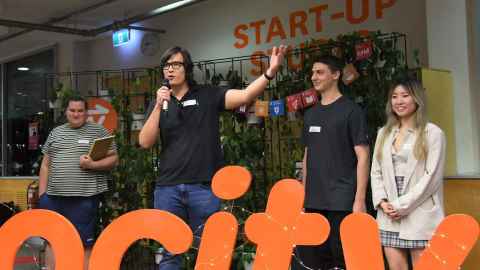Entrepreneurial engineering from Velocity Challenge winners
8 June 2021
Our Engineering Velocity Challenge winners describe their winning contest entries

Social Category Prize for Fistbump
Michael Shaimerden, Peter Goedeke, Mercury Lin, and Shannon Blackhall
Perhaps it was Covid-19, or maybe it’s something at New Zealand universities that makes it difficult for students to find meaningful friendships. Fistbump is the up-and-coming social media app helping students break out of their existing social circles and cultivate new relationships.
After observing the volume and recurrence of University of Auckland students online clambering for more opportunities to reach out to each other, Shaimerden and his team decided to come up with a site to match friend based on interests and personality. They asked Reddit for five volunteers and 200 signed up for the prototype.
“The people we’ve been talking to are extroverted and good conversationalists, but it’s hard to approach someone randomly already let alone approach a group.”
Michael Shaimerden, Peter Goedeke, Mercury Lin are Ba(Hons) Software Engineering students. Shannon Blackhall is a Ba(Hons) Engineering Science student.
Commercial Prize for NextGen SpaceComms
Mikhael Sayat
Modern satellites have evolved since the space race, but some of the technology they use to transmit data back to earth is still from the 1960s. PhD student Mikhael Sayat hopes to change that.
Sayat won the Commercial Prize for his idea to use optical lasers to transmit information from satellites to earth. Satellites currently use radio waves to send information. But as space technology advances, the data transmission can struggle to keep up.
Radio waves are slow, and optical lasers can transmit data at 10 to 100 times the speed of radio waves, Sayat says. They’re also far more secure. “Radio waves go out in every direction, so they’re very hackable,” he said. With optical lasers, he hopes to be able to detect a photon disruption and immediately shut down the data transmission if it's breached.
Mikhael Sayat is a PhD candidate studying free-space optical communications between satellites and ground stations.
Social Prize for an AI-driven application to cultivate a positive relationship with food and body image
Lily Battershill
Machine learning algorithms can predict what kind of music you’ll like, what movies you’ll watch, and what clothes you might want to buy. Now, PhD student Lily Battershill wants to use those same algorithms to help people recover from disordered eating behaviours.
Battershill proposed an app that would help people in their recovery journeys by creating a “toolbox,” that grows with them. The idea was born from frustration. She found that people who used apps like guided meditation programs, food diaries, yoga programs, cognitive behavioural therapy programs, and emotional trackers had to download multiple different programs to meet their needs.
“I want to create an app that’s dynamic, that takes into account what the user needs and likes,” Battershill said. “People at different stages of their recovery need different things.”
Lily Battershill is a PhD candidate studying Numerical Modeling of Volcanic Tsunamis.
Commercial Prize for emPower
Michael Allison and Natasha Humphries
Electricity is a static industry. The business has remained the same for decades: you use a certain amount of power, you get a bill, and you pay it. But some students are looking to disrupt that.
Undergraduates Michael Allison and Natasha Humphries proposed a company called emPower, which would allow people to generate their own power with solar panels and sell it to their neighbours via an app. The process for the user would be simple: they generate their power, put it into the pool, someone buys it at a rate that's dependent on how many people are involved, and emPower delivers money back to them.
In the long run, the team hopes to partner with solar panel providers and have people pay off their panels by selling electricity. “We want to create a peer-to-peer electricity distribution network,” Allston said.
Michael Allison and Natasha Humphries are undergraduates studying civil and environmental engineering and biomedical engineering, respectively.
UN Sustainable Development Prize for H2OQUAL
Dr Harshpreet Singh
While water quality testing is nothing new, real-time monitoring of water quality has eluded the industry until now. Dr Harshpreet Singh is collaborating with Dr Khalid Arif at Massey University to develop a multi-sensor system with a cloud computing interface to help everyone from council water workers to agricultural land owners detect water problems as they arise.
As a Technologist and Project Lead for commercial projects at the New Zealand Product Accelerator (NZPA), Dr Singh made connections through the NZPA network and came up with an idea to develop the economic, real-time water quality monitoring system for agritech and potable water.
“We see this problem in the media and people from different enterprises are approaching us with this problem, so why not build a system that can help the industry, New Zealand-wide?
Other team members include Dr Khalid Arif, Senior Lecturer at Massey University and Brian McMath, Business Development Manager at The Product Accelerator.